There are many studies that link verbal abuse, alongside other psychological and emotional abuse with anxiety and other mental health issues.
“Sticks and stones may break my bones, but your words they’ll destroy me.” – Cassandra Giovanni
You might be in a toxic relationship where your partner has been verbally abusing you for a long time and you have simply shrugged it off or worse still you weren’t even aware of it as abuse.
Does your partner tell you things that you find humiliating?
Does your parent yell at you for trivial matters?
Does every conversation with your partner leave you feeling worthless?
Do your friends call you names?
Is your partner often too critical about you?
Related: The Signs of Verbal Abuse
Verbal abuse, among other forms of abuse, like sexual abuse, psychological abuse, emotional abuse, and physical abuse, is quite difficult to discern. The reason being its subtlety.
Many instances of verbal abuse are nonchalantly avoided because reacting to verbal abuse seems too far-fetched to people. We rationalize verbal abuse like “It’s natural to have word fights then and now in a relationship.” Verbal abuse from parents is often encouraged, like “Yelling and screaming at children is a necessary means to discipline them.” Name-calling among friends is most often an example of fun and playfulness. But what we fail to notice is that we are indirectly perpetuating verbal abuse.
Verbal abuse: When words can kill.

Verbal abuse is a form of interpersonal violence. It is a specific type of psychological abuse. It is prevalent in various types of interpersonal relationships – say between children and parents, between romantic partners, between co-workers, between married couples, or between other fellow human beings.
Verbal abuse is the use of derogatory or negative language as a means to humiliate, belittle, criticize and demean a person. Verbal abuse is always meant to manipulate, threaten, harass, embarrass, insult and exercise control on the victim.
It triggers anguish, distress, pain, and feelings of worthlessness in the person to whom it is directed.
The tendency to abuse someone verbally mostly stems from passive aggression that a person has been suppressing for a long time. There is a sense of relief, a subtle sadistic pleasure that an abuser draws out of putting other people in a miserable state of feeling. Often a verbal abuser will laugh at dark jokes they throw at you, even when it has visibly hurt you.
Therefore, it’s not always mandatory for verbal abuse to be overt, direct, loaded with active aggression. It can also be insidious, masked, and expressed with feigned concern which makes it difficult to be identified.
“You must take care of the blob of fat growing on your stomach. Just making a suggestion, you see. Staying fit helps.” This statement, for example, sound innocent on the surface but has underlying aggression to it. The first line was clearly meant to downgrade you. It was not meant to display concern for you.
A verbal abuser uses varied and multifaceted tactics to inflict the hardest blow on the victim. Sometimes they will use these techniques with the combination of other lethal techniques to completely destroy the victim.
Related: Verbal Abuse Disguised As Jokes
Mentioned here are 10 common patterns of verbal abuse used to manipulate their victims:
1. Demeaning comments
Demeaning comments are specifically meant to attack your race, gender, background, community, lifestyle, personality, etc. It could be any statement meant to make you feel insufficient, insignificant, or worthless about yourself.
For example: “You are such a pussy.” “Are all women cry babies, like you?”

2. Criticism
Criticisms, when healthy are welcomed from time to time. They help you in self-improvement. But when these criticisms get consistently irrelevant and gradually lowers your self-esteem, it is no more healthy.
For example: “Are you sure you will be able to do this project? Given how naïve you are, I don’t think you can.”
Related: Covert Verbal Abuse: Passive Aggressive Behavior That Aims to Control You
3. Threats
Threats seem to be easy to identify. But they will often be disguised in such a manner that you will question your own accountability. “Was I really not at fault?” or think “I deserve that.”
Threats can be personal, professional or otherwise and is always a consequence of failure to put up with the demands of the abuser. It is directly meant to induce fear in the victim.
For example: “If you do not let me do that, I will harm myself.” “I will throw you out of the house if you do not listen to me.”
4. Blame
This is a common form of verbal abuse in which a person will completely hold someone else accountable for their own actions and get rid of the responsibility.
The person might blame another, even when they are entirely innocent. This makes the victim wonder what his/her mistake was, leaving them entirely baffled.
For example: “We could not make it to the finals because of you.” “You are not letting me achieve my dreams.”
5. Accusations
Almost similar to blaming, the accusation is often the result of the projection of one’s own infidelities or insecurities on to the victim. This leaves the victim wondering if they are really doing something undesirable or not.
For example: “I know why you have dressed in those revealing clothes. Those are meant to seduce your co-workers.” “I am sure you are cheating on me.”
6. Name-Calling
Verbal abusers often make use of special ‘names’ to yell at the victim and frighten them, belittle them and lower their self-respect.
For example: “You stupid, empty-headed bitch, look at your miserable self.”
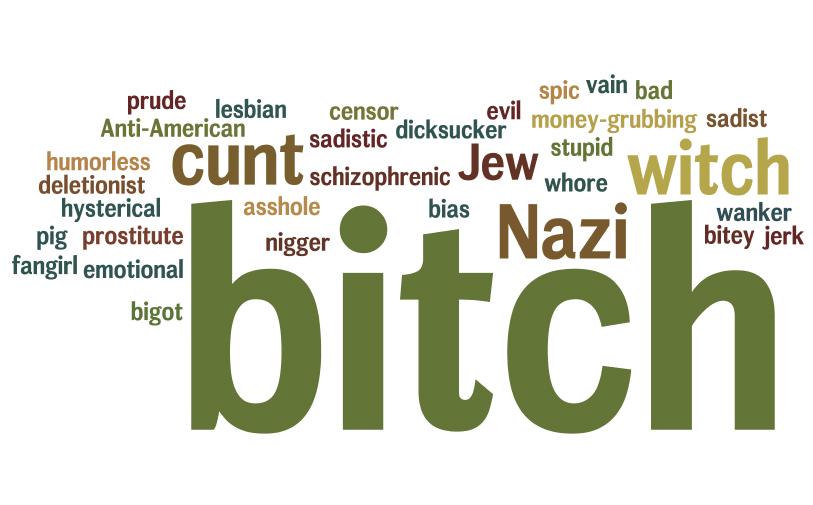
7. Spiraling arguments
Does your partner constantly disagree with you? Or is your parents always finding an opportunity to argue with you?
If these arguments make you feel drained and tired leaving no space for you to hold your opinion, as the abuser mostly denies, ignores, interrupts, and isolates your views when arguing. Often this is done by shouting over the top of your voice just to subdue your voice and make his/her point stand out.
These arguments go in circle and circle, leading to nothing fruitful expect for you feeling mentally drained and violated.
For example: “I am shouting because you are making me shout!”
Related: 10 Common Patterns Of Verbal Abuse To Watch Out For
8. Condescension
Some jokes are for fun, while others are to put people down. Everything changes when the tone is different. If the tone is sarcastic, even when the words seem harmless, you are passing off verbal abuse as a normal statement.
For example: “Oh poor chair! Look how it’s complaining about your weight.”
9. Mood killers
These are typical statements to kill your good mood. This suddenly comes off and blows away your entire good mood for something.
For example: Suppose you have planned a night out with your friends, with all your efforts, searched out the best restaurant to dine in but ultimately one of your friends ends up commenting “Are we again going to that worthless restaurant serving stale foods?”
BAM! Now you are in no mood to go out with them.
10. Attack interests
This is to make disrespectful comments about things that you are passionate about or your deepest interests.
For example: “You write poems? Isn’t it supposed to be only meant for nerds?”
The ways might be various but verbal abuse leaves a person susceptible to an immense amount of stress and anxiety.
The following are the short term and long term impacts of verbal abuse on a person:
Short-term impacts:
- Lack of motivation.
- Feelings of worthlessness.
- Overthinking.
- Indecisiveness.
- Lowered self-esteem.
- Diminished social interactions.
- In extremes, self-harming behaviors.
Long term impacts:
- Anxiety.
- PTSD.
- Depression.
- Suicidal ideation.
- Eating disorders.
- Sleep disturbances.
- Gastrointestinal problems.
- Migraines.
- Physiological pain.
- Difficulties in interpersonal relationships.
- Dissociation.
- Substance abuse.
- Anger and hostility.
Related: Parental Emotional Abuse: The Unseen Scars Left Behind
How is anxiety associated with verbal abuse?
Verbal abuse brings about reactions in the victim, which is almost similar to stress and anxiety. To explain how verbal abuse can lead to anxiety, it is important to know how verbal abuse usually functions.
Verbal abuse, like other forms of abuse, comes in three distinct phases:
Phase I – Tension building phase
Phase II – The Violence Phase
Phase III – The Honeymoon phase
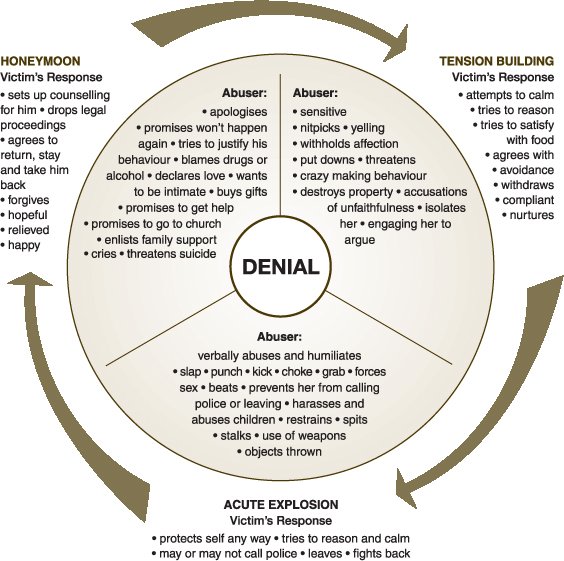
The first phase (tension building phase) is where the abuser gets very demanding, emotionally unstable, moody, controlling, critical and starts applying his manipulative techniques like threats, explicit, yelling and shouting to trigger fear and terror in the victim.
The victim is often baffled, caught on guard as the attack is typically unpredictable.
Unsure of how to handle the situation, the victim applies all his/her resources to minimize the problem and bring the situation under control. The victim may start to pacify the abuser but the tension intensifies and culminates into the next phase. The efforts of the victim to bring the situation under control are rendered useless as he/she, himself or herself, starts getting more and more under control.
In the second phase (The violence phase) the behavior of the abuser escalates and reaches a peak where the victim feels to have no control over the situation altogether. The control amplifies, sometimes leading to more complex types of psychological abuse like guilt-tripping, gaslighting, blame-shifting, and useless accusations. When the victim gradually gives in to the manipulation, the abuser starts to get physically violent, often using means like hitting, thrashing, biting, or grabbing the victim, alongside verbal threats.
The victim here fails to comprehend the entire situation and why it blew up. As the violent phase occurs as a result of the emotional state of the abuser or other external triggers, the victim here has nothing to do other than plead with the abuser to “get it over with.”
The third phase (the honeymoon phase) brings about a sudden change in the behavior of the abuser, as he/she starts to be more considerate, apologetic, and remorseful of the entire situation. Some abusers will feel extremely miserable for their actions, beg for forgiveness and shower the victim with love, affection, and sympathy. They will even end up blaming, harming, or punishing themselves to gain back the victim’s attention, promising to “never repeat it” again in the future.
Other abusers will simply walk out of the mess and ignore it as nothing happened. The victim is readily convinced and forgives the abuser to “bring the situation under control” and ‘restore harmony between the two’. This is where, the victim gives himself up for another, inevitable, cycle of abuse.
Related: Covert Verbal Abuse: Is Someone Telling You How You Should Feel?
Now stop and imagine the entire scenario.
If this keeps happening to you on a regular basis, without any genuine fault of yours, how will you react to it?
Abuse typically is recurrent in nature. Once it happens, it will happen again and again.
When a person is attacked with harsh, demeaning words, the “Flight or fight” mode is automatically activated. Our brain simply perceives the situation as extremely provoking and unhealthy for the self.
Here, the body finds no way to flee the situation (which is often the case in any type of abuse, as the victim is often threatened with life-changing consequences if they leave the abuser) the body’s sympathetic system will be activated, displaying symptoms like sweating, hot and cold flashes, dry throat, increased heartbeat – which are absolutely natural when faced with an alarming stimulus.
Over time, your body is getting accustomed to this kind of anxiety triggering stimuli.
After repeated abuse, you have learned through experience and vigilance, the signs of an upcoming abuse cycle. So, now every time, the abuser speaks to you in a higher tone, starts getting a little aggressive or defensive, you will start to apprehend a negative outcome (maybe another episode of abuse is on the way).
Hence, the body starts displaying symptoms similar to that of an anxiety attack like palpitating heart, shortness of breath, sweating and dizziness, even when there is no relevant trigger. It’s merely the perceived probability of abuse that starts bringing about these anxiety symptoms now.
You see, the abuse is not just messing with your mind, but is making you anxious over time.
When this verbal abuse continues for a long period of time (which is often the case), It will leave the victim jumpy throughout the rest of the lifetime. They might acquire social anxiety due to the fear of getting repeatedly socially insulted and bullied. They might even become extremely vulnerable in relationships, as the fear of facing similarly abusive people isn’t eliminated.
Research shows that perceived parental verbal abuse in childhood and peer-related verbal abuse in adolescence has been associated with a risk of depressive mood, anxiety, anger-hostility, suicidality, dissociation, or drug use in young adults. (2,3,4,5,6)
According to psychology Professor Natalie Sachs-Ericsson, people who were verbally abused had 1.6 times as many symptoms of depression and anxiety as those who had not been verbally abused and were twice as likely to have suffered a mood or anxiety disorder over their lifetime. (7)
Verbal abuse is not less impactful as compared to other forms of abuse.
It might seem to be of no significance but prolonged periods of being verbally abused have even been linked to many mental health issues like delinquent tendencies, substance abuse, and suicidal ideation in adolescents, alongside depression and anxiety.
References:
Teicher, M. H. & Samson, J. A. Childhood maltreatment and psychopathology: A case for ecophenotypic variants as clinically and neurobiologically distinct subtypes. Am J Psychiatry 170, 1114–1133 (2013) Teicher, M. H., Samson, J. A., Polcari, A. & McGreenery, C. E. Sticks, stones, and hurtful words: relative effects of various forms of childhood maltreatment. Am J Psychiatry 163, 993–1000 (2006). Teicher, M. H., Samson, J. A., Sheu, Y. S., Polcari, A. & McGreenery, C. E. Hurtful words: association of exposure to peer verbal abuse with elevated psychiatric symptom scores and corpus callosum abnormalities. Am J Psychiatry 167, 1464–1471 (2010). Schalinski, I. et al. Type and timing of adverse childhood experiences differentially affect severity of PTSD, dissociative and depressive symptoms in adult inpatients. BMC Psychiatry 16, 295 (2016). Polcari, A., Rabi, K., Bolger, E. & Teicher, M. H. Parental verbal affection and verbal aggression in childhood differentially influence psychiatric symptoms and wellbeing in young adulthood. Child Abuse Negl 38, 91–102 (2014). Khan, A. et al. Childhood Maltreatment, Depression, and Suicidal Ideation: Critical Importance of Parental and Peer Emotional Abuse during Developmental Sensitive Periods in Males and Females. Front Psychiatry 6, 42 (2015). Invisible Scars: Verbal Abuse Triggers Adult Anxiety, Depression
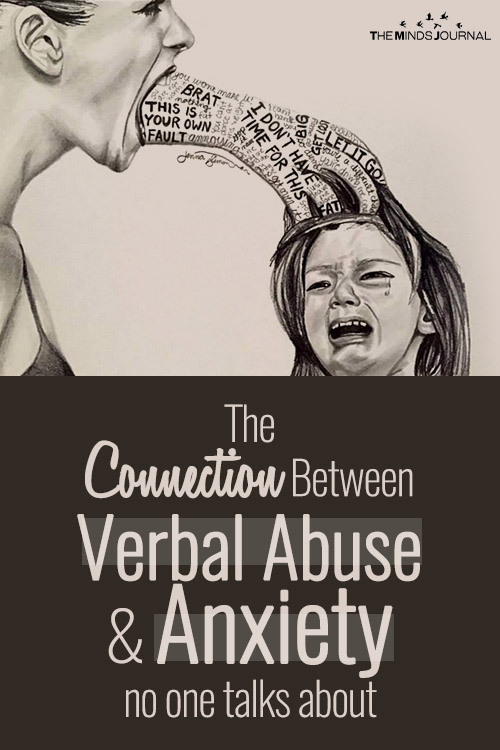
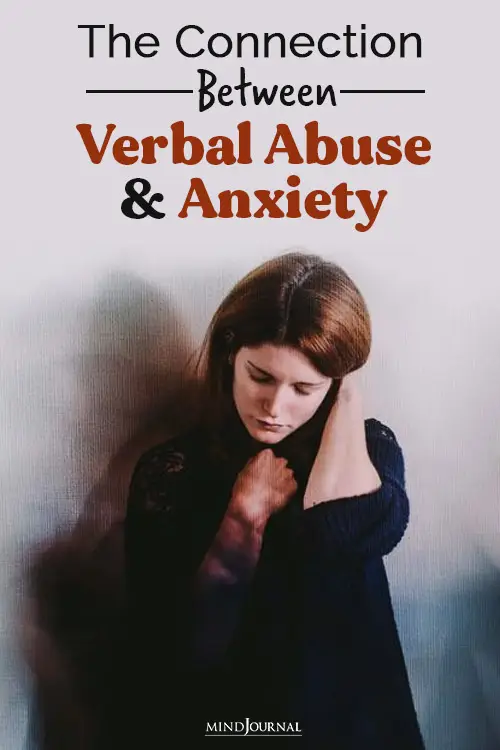
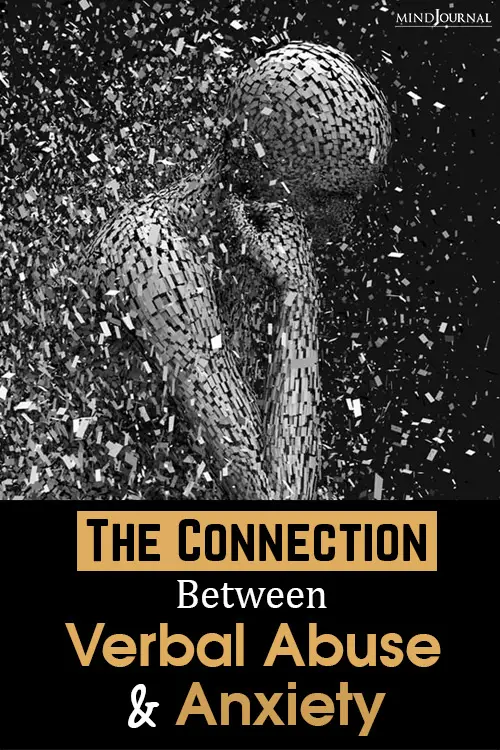
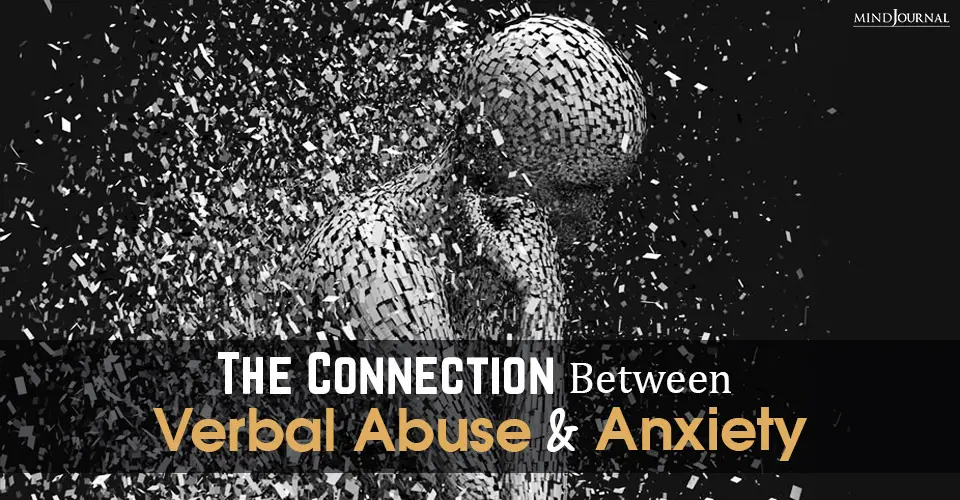







Leave a Reply
You must be logged in to post a comment.